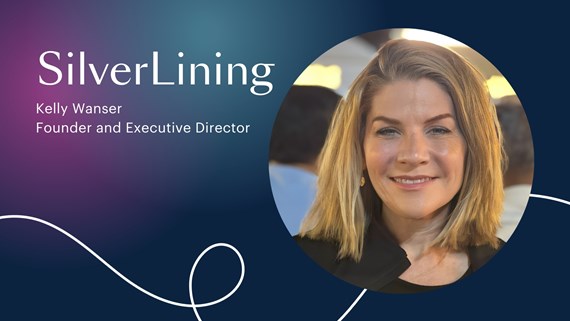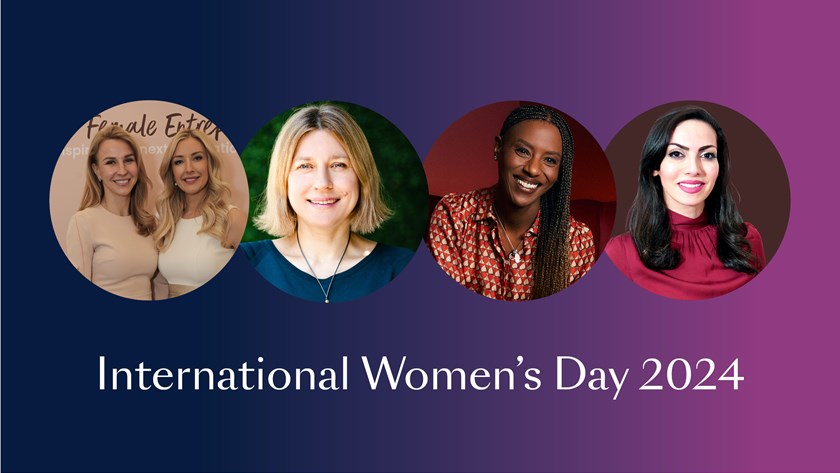Inspiration Series: an interview with Kelly Wanser, Founder and Executive Director of SilverLining
Insight

Kelly Wanser is the Founder and Executive Director of SilverLining, a non-profit organisation dedicated to ensuring that society has sufficient information and options to address near-term climate risk. SilverLining engages with the research community, policymakers, technologists, civil society and people from all walks of life to help advance research and innovation in efforts to ensure a safe climate.
Please tell us a little about your background and what led you to set up SilverLining
My background is in the tech sector, where I founded companies in IT infrastructure, security, and networking. SilverLining really started as a passion project which developed into my work. I went full time around nine years ago. I came into looking at climate change as a result of my own concern. My initial question was “what is the risk of climate change in my lifetime and what can we do about it?”. In my looking for an answer, I started by approaching the top people I could find in the field and putting my question to them. It became clear to me that climate change was a sizable risk and that reducing emissions is critical, but that even more action is needed. I started looking into interventions that could be made to actively cool the climate system, which ultimately led to me starting SilverLining to equip decision makers and society with critical information needed to evaluate climate interventions.
What is SilverLining doing to ensure a safe climate?
SilverLining is focused on climate interventions, such as marine cloud brightening. A key part of what we do at SilverLining is to fund and coordinate research into climate change. We also work on the policy side and look at ways to get policy bodies into a position where they are receiving good, sound advice which in turn enables them to make good, science-based decisions. We want to accelerate how quickly we can understand various aspects of climate change and find ways to help society make good decisions going forward. Covering both the research and policy side is actually quite rare in the climate space, but the research is key in informing our policy work. It enables us to work out what is viable, what might be viable and what is totally off the table in terms of measures we can take to combat climate change and cool the planet.
Previously there was the idea of winners and losers with climate change, and it was thought that wealthier countries would be well placed to deal with, and be less affected by, climate change. However, the impact of climate change has now really started to show around the world, and I think that this level of extreme weather and climate-linked disasters has come as a surprise, especially in Europe and Canada and the US. For example, the recent wildfires in Canada had serious knock-on effects in the US. The Hawaii flashfire is another example. The fact that it has become clear that even wealthy northern countries will be affected by climate change will hopefully help in driving necessary actions.
As an entrepreneur, I also have a high tolerance for risk and failure, but at SilverLining failure is not an option. There are a lot of people in the world who will not have a place to live come 2050 if nothing is done. We haven’t yet reached the “Oh sh**!” point of crisis with climate change in which suffering, and impacts have escalated to the point that people around the world are seeking some form of intervention. Working on improving our ability to understand what the climate system will do, and to explore and evaluate possible interventions, can put us in a much better position if we do reach this moment. As a society, we need to reduce emissions as aggressively as possible, and we also need to learn as much about the most promising climate interventions as we can. The good news is that we think it is absolutely possible to do the right things in the coming decades to navigate a path to safety in the coming decades while society transitions to a sustainable future. In Silicon Valley, people say that there was, for example, no internet 40 years ago, so of course the world can change in 50 years!
How did you build your team and what advice would you give to other entrepreneurs around hiring talent?
When building a team, I always start with senior, experienced people. It is important to find people who know more than you do. I have also found it effective to give my team a lot of freedom in how they do their work. Our mission is clear and fixed, but the way it is achieved is open. In fact, I may be pretty vague about the specific of what each a team member might to do at the beginning, I just make the mission very clear and collaboratively iterate on their ideas for how to move forward. This might not be right for every business, but for us it has led to better ideas than I would have conceived of on my own and a happier, more collaborative team.
I have no boundaries on how big my team wants to think, and, for the right people, this can be very rewarding. My approach feeds into the sort of people I look to recruit: culture fit is very important. I have got much better at recruiting people who are a good fit and have learnt that it is important to be mindful of the fact that working for an early-stage company does carry risk and isn’t for everyone. This can actually make it really hard to hire from big companies, because the structure and processes are just so different.
I would also recommend trusting your gut: be very careful about hiring somebody your gut has questions about, even if you are feeling pressure from your investors or stakeholders or the pedigree of the person in question is very impressive.
Finally, if someone who is a bad fit slips through the net, it is crucial to ensure that any toxic dynamics are dealt with as quickly as possible and that they are not just allowed to continue. Of course, personnel issues take up a lot of management time and create huge stress in every business. However, the opportunity cost of dealing with this in an early-stage business is huge: it can really affect the trajectory of the business and go straight to enterprise value. It isn’t always cheap to get people out, but if it is the right decision, it is critical.
What one thing do you wish everyone knew about climate change?
I wish that everyone knew that, despite all the talk and publicity around climate change, global investment in climate research and observations – the science and data we need to predict and respond to climate change – has been flat for 30 years. When you look at this alongside inflation, investment has actually been declining. We published a report this year, Near-term Climate Risk and Intervention, a Roadmap for Research, U.S. Research Investments and International Scientific Cooperation that describes what’s needed. Accelerating climate research investment is crucial to a safe future for all of us.
This publication is a general summary of the law. It should not replace legal advice tailored to your specific circumstances.
© Farrer & Co LLP, November 2023






